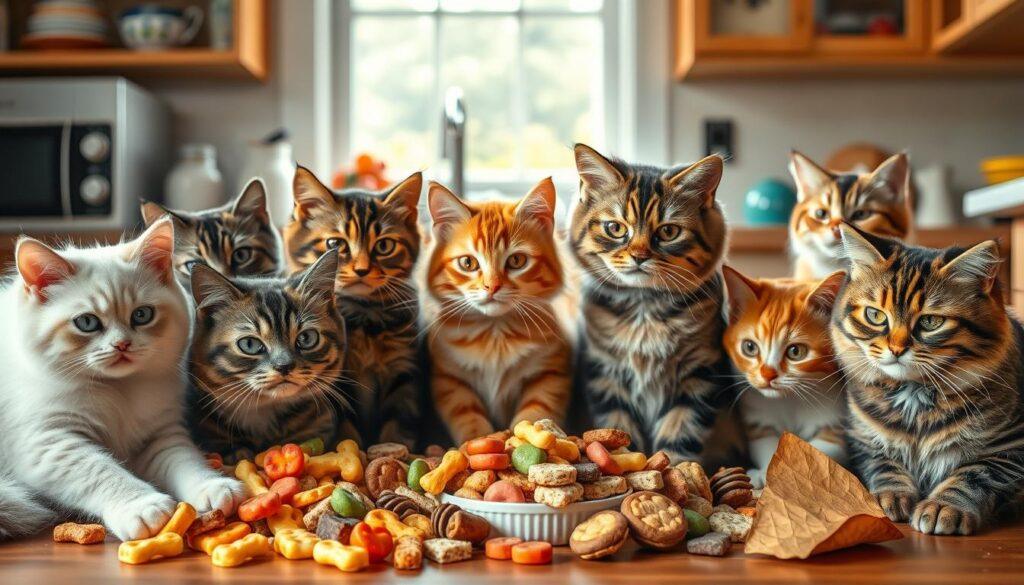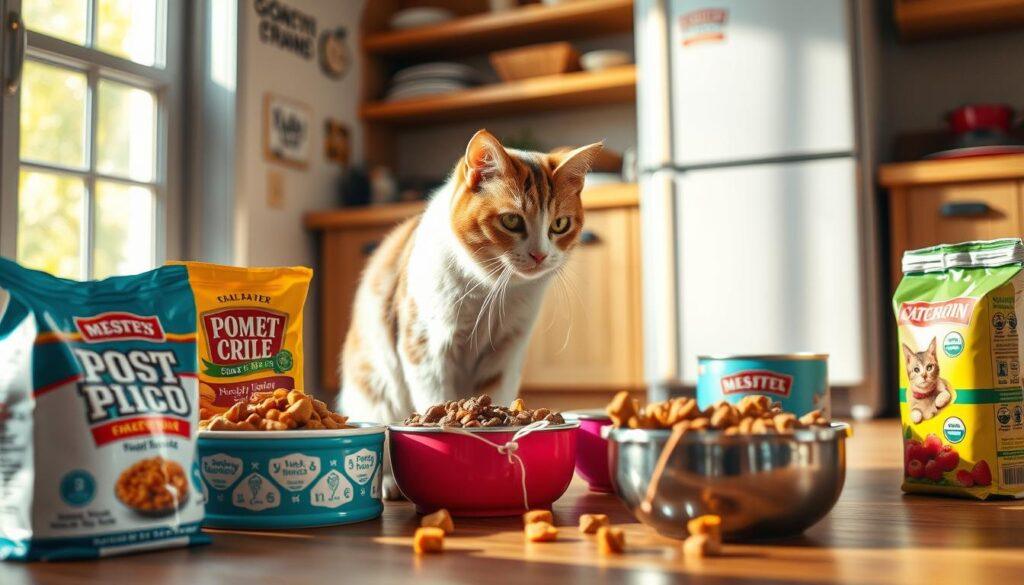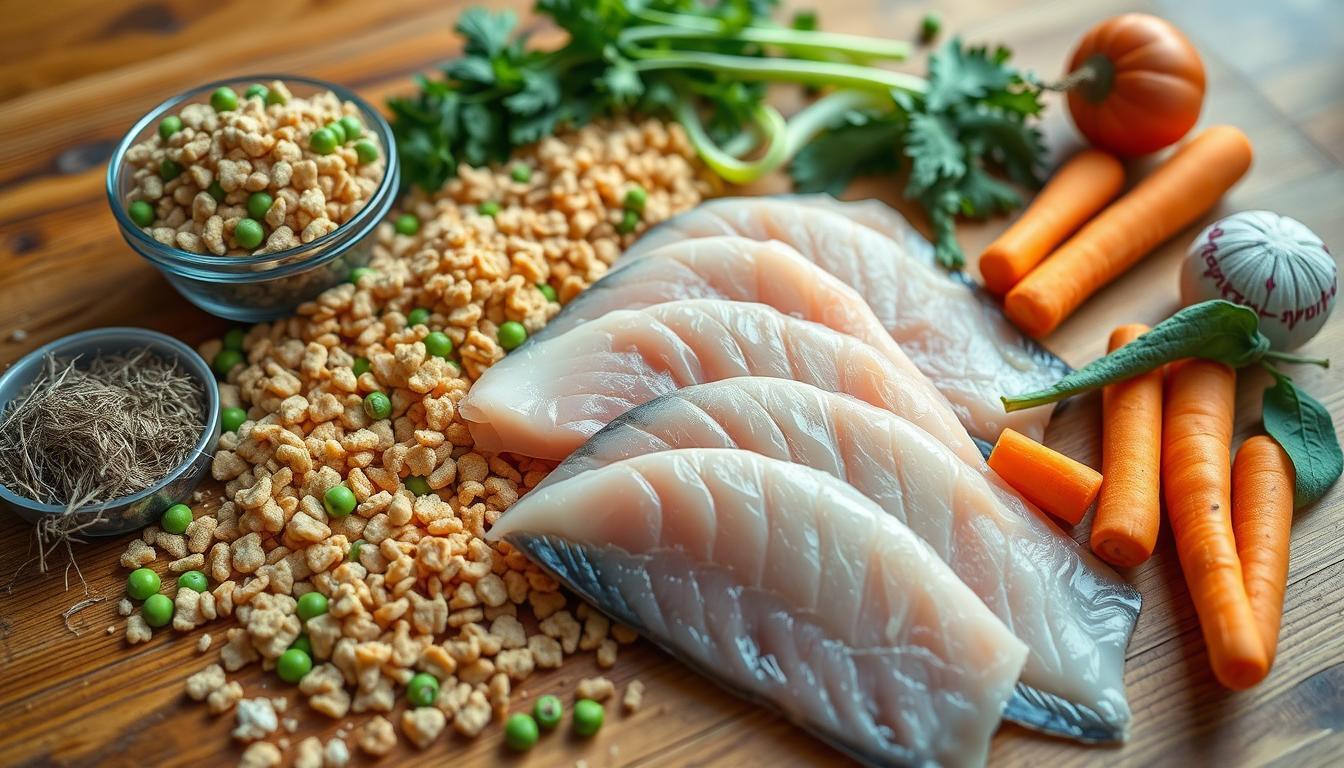Did you know that about 80% of pets have dental disease by age three1? This fact shows a big problem for many cat owners. Their cats stop eating regular food and only eat treats. This can be very frustrating and worrying, as cats need a balanced diet to stay healthy.
Cats have their own diet preferences. These can be due to dental issues, stomach problems, stress, or changes in their environment2. If your cat only eats treats, it’s important to find out why and make sure they get the right food.
Too many treats can make cats not want to eat their regular food. They might think they only get treats if they don’t eat their meals2. This can start a bad cycle, making it hard to get your cat to eat well again.
Changes in when and how you feed your cat can also make them not want to eat2. A regular routine and a calm place to eat can help your cat enjoy their meals and stay healthy2.
Key Takeaways:
- Find out why your cat loves treats so much, like dental or stomach problems, or stress.
- Make sure they eat well by slowly cutting down on treats and introducing new foods.
- Make eating time positive with a regular schedule and a quiet place to eat.
- Get vet advice to check for health issues and get a special diet plan for your cat.
- Be patient and use positive rewards to help your cat eat their regular food.
Understanding Your Cat’s Treat Obsession
Cats love treats, but sometimes this love can become an unhealthy obsession. As a cat owner, it’s key to understand why treats are so appealing and when they become a problem. Some cats may act strangely around treats, like making loud noises or jumping aggressively. These actions can happen if they get treats during meals3.

The Appeal of Cat Treats
Treats taste and feel great to cats, often more than their regular food. They can be rewards for good behavior or to encourage positive actions. But, it’s important to give them out sparingly because they’re high in calories. Too many treats can cause weight gain and health issues like diabetes and heart disease4.
When using treats for cat behavioral reinforcement, consider a few things:
- Keep the family consistent in treating addiction
- Use treat dispensers to control how much they eat
- Give toys for mental stimulation
- Change up the treats to keep things interesting
- Train with clickers for positive reinforcement
When Treats Become a Problem
Too many treats can upset a cat’s diet and cause health problems. Signs of treat addiction include constant meowing, begging, and aggression towards other pets4. Treat-related obesity can also lead to serious health issues like arthritis and skin problems4.
In homes with multiple cats, feeding them together can cause fights over treats3. To avoid these issues, try these strategies:
| Strategy | Description |
|---|---|
| Slow Feeders and Puzzle Toys | Help cats eat slower and prevent hunger3 |
| Timed/Auto-Feeders | Decrease aggression and begging by making the feeder the food source3 |
| Feeding Cats Separately | Reduce conflicts and territorial tension in multi-cat homes3 |
It’s important to check if medical issues are causing treat obsession. Conditions like parasites or diabetes can lead to abnormal eating35. If you think your cat is obsessed with treats, talk to your vet to find out why and get help.
Ruling Out Health Issues
If your cat suddenly stops eating regular food but still eats treats, it might be a health issue. It’s important to know your cat’s eating habits and watch for signs of health problems. Taking your cat to the vet is crucial to check for health concerns and ensure they get the right food and care.
Dental Problems
Dental issues are a common reason for cats to lose their appetite. Over 80% of cat owners say their cats are picky eaters because of tooth pain6. Cats over 3 years old are more likely to have dental disease7. Treats might be softer and easier for them to eat, which could be why they prefer them.
Gastrointestinal Issues
Problems with the stomach or intestines can also make cats not want to eat their regular food. Many pets get sick from eating things they shouldn’t, like antifreeze7. If your cat eats something bad, they might throw up or have diarrhea. This makes them not want to eat. You need to take them to the vet right away to help them6.
Other Medical Conditions
Many health problems can make cats not want to eat, like kidney disease, which is more common in older cats7. Cats with kidney disease might drink more water and lose weight7. If your cat is not eating and seems tired or sick, you should take them to the vet quickly6.

To figure out if your cat’s appetite is affected by health issues, keep a log of their eating habits. Include what they eat and any changes in their behavior or litter box use. This info is helpful when talking to a vet. Regular vet visits are also important to keep an eye on your cat’s health6.
| Common Health Issues | Symptoms | Potential Impact on Appetite |
|---|---|---|
| Dental Problems | Bad breath, drooling, difficulty eating | Avoidance of hard or crunchy food |
| Gastrointestinal Issues | Vomiting, diarrhea, loss of appetite | Refusal to eat regular food |
| Kidney Disease | Increased thirst and urination, weight loss | Decreased interest in food |
Understanding health issues that can affect your cat’s appetite and working with your vet is key. This ensures your cat gets the care and nutrition they need to stay healthy. Remember, early action and regular check-ups are important for your cat’s well-being7.
Evaluating Your Cat’s Diet
A balanced diet is key for your cat’s health. If your cat prefers treats over regular food, it’s time to check their diet. Finicky eating behavior in cats might be due to flavor enhancers in pet food8. But, relying only on treats can cause nutritional imbalances and health problems.
Ensuring a Balanced Nutrition
When looking at your cat’s diet, consider these points:
- Protein: Cats need a lot of protein because they are meat-eaters. Canned food is best for cats with health issues like urinary problems and diabetes9.
- Carbohydrates: Cats don’t need carbs in their diet, unlike humans and dogs9.
- Life Stage: Kittens need different food than adult cats. Kitten food has more fat and protein for growth. Kittens should eat kitten food until they are about 9-12 months old9.
- Hydration: Cats need to drink enough water for their body functions. They should drink about 7–9 ounces of water a day if they weigh around 10 pounds9.
Talking to your vet can help find the best diet for your cat. This depends on their age, health, and needs.
Rotating Food Flavors and Textures
To make mealtime fun and encourage eating regular food, try changing food flavors and textures. Most cats eat the same food every day8. But, changing their diet can prevent them from getting bored with food and help during shortages8.
Start new foods slowly to avoid stomach upset. Cats might vomit or have diarrhea if their diet changes too fast, just like humans8. Some cats can be sensitive to common ingredients like fish, chicken, wheat, and corn8.
| Food Type | Pros | Cons |
|---|---|---|
| Wet Food | High moisture content, appealing texture | Can spoil quickly if left out |
| Dry Food | Convenient, helps maintain dental health | Low moisture content |
| Raw Diet | Mimics natural diet, high protein | Risk of bacterial contamination |
Remember, treats should be given in moderation. They are not a balanced source of nutrition9. By ensuring a well-rounded diet and offering variety, you can help your cat develop healthy eating habits and prevent them from becoming overly reliant on treats.
Creating a Positive Feeding Environment
Creating a calm and consistent feeding area is key for your cat’s regular meals. Cats love routine and thrive on it. Feeding them at the same times each day helps regulate their appetite and promotes healthy eating10. A structured meal schedule can also prevent overeating10.
Understanding your cat’s food habits is important. Some cats like to eat alone, while others enjoy company during meals. Knowing your cat’s preference can greatly improve their willingness to eat10. If your cat likes company, sit with them and gently pet them during meals. For those who prefer privacy, make sure they have a quiet space to eat10.
Providing a Calm Eating Space
Having a dedicated feeding area can make your cat feel more comfortable during meals. Try different locations for their food bowls to find their favorite spot10. Consider the area’s noise level and if it’s close to where other pets are. In homes with multiple cats, separate feeding areas can reduce stress during meals1112.
Choose stainless steel, ceramic, or glass bowls over plastic. Plastic bowls can harbor bacteria and smell bad, which might make your cat not want to eat10. Also, clean the bowls well after each use to keep the eating area clean12.
Establishing a Consistent Routine
Consistency is crucial for training cats with treats and healthy eating habits. Sudden changes can upset your cat’s appetite and lead to picky eating1112. A predictable routine helps your cat feel calm and positive during meals.
If your cat is stressed or anxious about eating, try using a Feliway Diffuser. These devices release calming pheromones that can help your cat relax and eat10. Interactive feeders or food puzzles can also make meals more fun and mentally stimulating for your cat10.
Every cat is different, so what works for one might not work for another. Be patient and adjust your approach as needed. If you’re worried about your cat’s eating habits, talk to your vet for advice and guidance11.
Strategies to Encourage Regular Food Consumption
If your cat loves treats more than regular meals, it’s time for a change. Use clever strategies to make them enjoy their food more. This way, you can help your cat enjoy a balanced diet again.
Making Mealtime Engaging
Cats are natural hunters. Using this instinct can make mealtime exciting. Interactive feeders and puzzle toys are great for making them curious and eager to eat.
These toys challenge your cat, making eating more rewarding. Some cats also prefer eating in a quiet spot to avoid stress13.
Gradually Reducing Treat Intake
Treats are great for bonding and rewarding your cat. But too many can make them lose interest in regular meals. Start giving fewer treats and watch the treat-to-food ratio.
Short periods without food can help your cat recover from illness and heal wounds14. Cats can also get liver problems from not eating enough14.
Using Positive Reinforcement
Positive reinforcement is key in changing your cat’s behavior. Praise and playtime are great rewards when they eat well. This makes mealtime a positive experience.
Some cats may eat more if you hand-feed them13. Remember, cats need quick treatment if they stop eating14.
Try different foods, textures, and flavors to see what your cat likes. Warming or cooling food can also help. Cats may prefer wet food, so try different types13.
If these tips don’t work, talk to your vet. They can check for health issues and help with your picky eater cat.
When Your Cat Will Only Eat Treats: Expert Advice
If your cat only eats treats, it’s important to find out why. Talking to a vet or a feline behaviorist can help. They can give you advice that fits your cat’s needs and likes15.
Dental issues or stomach problems might make your cat not want to eat regular food15. A vet can check for these health problems. This can help figure out why your cat only eats treats.
Changes in your cat’s life can upset their appetite. Stress and anxiety might make them only eat treats15. Keeping their eating routine the same and making their eating area calm can help15. Also, having separate eating spots for each cat can reduce stress during meals15.
Cats might be picky because of food texture or taste. Trying different wet cat foods can help find something they like16. Slowly introducing new foods and not rewarding picky eating can help them eat better15.
“Understanding your cat’s unique preferences and needs is key to addressing a treat-only diet. Working closely with a veterinarian or feline behaviorist can help you develop a tailored plan to ensure your cat receives proper nutrition and care.”
Cats might prefer moist foods because of their natural instincts and need for water16. Giving them quality wet food and fresh water can meet these needs16.
Controlling how much food they get and not giving too many treats is important for their health16. Serving food at room temperature or a bit warm might make it more appealing16.
By understanding cat food habits and getting expert advice, you can help your cat eat better. This ensures they stay healthy and happy.
Conclusion
When your cat only eats treats and not regular food, it’s important to act fast. This ensures they get a balanced diet and stay healthy. Dental issues, digestive problems, or stomach pain might be why they prefer treats17.
Stress and anxiety can also make a cat choose treats over food, especially if the home changes or they feel lonely17. Cats can survive for up to two weeks without food, but they must drink water regularly. Most of their water comes from their food18.
To fix this, understand why they’re not eating, check for health issues, and make sure their diet is good. Create a positive eating space and try to get them to eat regular food again. It’s key to address any stomach or digestive problems to find the right food for them17.
Health issues like toothaches or gum disease can make eating painful, so they might not want to eat19. Offering fresh, wet food can help because of its strong smell and hydration benefits. This is especially important in hot weather when cats might not feel as hungry19.
Feeding at the same times every day and in a calm place can help. Moving the food area to a quiet spot can also encourage them to eat regular food1719. But, too many treats can make them picky, so it’s important to use them sparingly17.
Getting advice from a vet is crucial for finding the right solution for your cat. They might prescribe medicine to help them eat more and feel better1718. By understanding feline diet preferences and focusing on their nutrition, you can keep your cat healthy and happy.
FAQ
Why does my cat only want to eat treats?
Can a diet of only treats harm my cat’s health?
What should I do if my cat suddenly refuses regular food and only eats treats?
How can I encourage my cat to eat regular food instead of just treats?
Should I seek professional help if my cat only eats treats?
Source Links
- 6 Reasons Why Your Cat Is Not Eating and What To Do – https://www.petmd.com/cat/nutrition/cat-not-eating-what-to-do
- Why Is My Cat Not Eating Food but Will Eat Treats? – https://basepaws.com/cat-insider/your-cat-eats-treats-but-not-food-what-to-do?srsltid=AfmBOooidqWkBmzgr0nJnkZRvHyVx94JeWk231W-i0nWHtt39-qxLdDh
- Dealing with your Cat’s Food Obsession – https://catnetting.com/blogs/cat-demy/dealing-with-your-cats-food-obsession?srsltid=AfmBOooy1MCMO38Ckegl0kv-fobgs1gEpCtFeihKMZzgGaQtsYmi0Sp4
- My Cat Is Addicted to Treats, What Can I Do? (Vet Answer) – Catster – https://www.catster.com/ask-the-vet/cat-is-addicted-to-treats/
- How to Handle a Food Obsessed Cat – https://www.catgenie.com/blogs/catgazette/how-to-handle-a-food-obsessed-cat?srsltid=AfmBOopG-v8hrAgxu5hIVTJkVYoB-ma6hFzKc6uaph3ZEeI6SIskoMv-
- What Should I Do If My Cat Won’t Eat? | Paw CBD – https://www.pawcbd.com/blogs/posts/cat-wont-eat-what-should-i-do
- Why Your Cat Won’t Eat and What To Do About It – DrPetMD – https://drpetmd.com/why-wont-my-cat-eat/
- Should Cats Eat The Same Food Every Day? – Two Crazy Cat Ladies – https://twocrazycatladies.com/cat-food/should-cats-eat-the-same-food-every-day/?srsltid=AfmBOop1QhqM608cD7tI6czoCQqg1GagWk753MxA8eGiGBmF6dQUEgon
- Can’t-Miss Tips For Optimal Cat Nutrition – https://www.ctvsh.com/services/cats/blog/cant-miss-tips-optimal-cat-nutrition
- Cat Won’t Eat? Reasons Why & Tips to Help. | Preventive Vet – https://www.preventivevet.com/cats/cat-wont-eat-how-to-stimulate-your-cats-appetite
- Why Is My Cat Not Eating Food but Will Eat Treats? – https://basepaws.com/cat-insider/your-cat-eats-treats-but-not-food-what-to-do?srsltid=AfmBOoqGEM7AoRYRhaWyDRN0DvWFNcGovDlaO1fuHD7bBeFdpOOCJoKp
- My Cat Is Not Eating – How to Feed a Fussy Cat | Purina – https://www.purina.co.uk/articles/cats/feeding/guides/how-to-feed-a-fussy-cat
- 8 Ways To Get Your Cat To Eat – https://www.undertheweatherpet.com/blogs/under-the-weather/8-ways-to-get-your-cat-to-eat?srsltid=AfmBOoo00IhHaphYuMP5-QRV_-HE2V1L-a5NDnDlJ7dBO58uW4bZMhYI
- Encourage your cat to eat – https://icatcare.org/advice/how-to-encourage-your-cat-to-eat/
- Why Is My Cat Not Eating Food but Will Eat Treats? – https://basepaws.com/cat-insider/your-cat-eats-treats-but-not-food-what-to-do?srsltid=AfmBOoptVAGwqFwu9hyYhD5iaUbSI6p7plCqJ9jkMb7DacuaLuG4pI7h
- Cat only eating jelly | Blog – https://www.cats.org.uk/cats-blog/why-does-my-cat-only-eat-jelly-off-their-food
- Why Is My Cat Not Eating Food but Will Eat Treats? – https://basepaws.com/cat-insider/your-cat-eats-treats-but-not-food-what-to-do?srsltid=AfmBOopVidbV91J8CjCWnlUxfCOxT6YDbkvxSlkzdJllalf_h4g89a_n
- My Cat Stopped Eating: What Should I Do? – Festival Animal Clinic – https://festivalanimalclinic.com/blog/my-cat-stopped-eating-what-should-i-do/
- Why your cat isn’t eating: common reasons and how to help! – https://www.catslove.com/en/cat-not-eating


